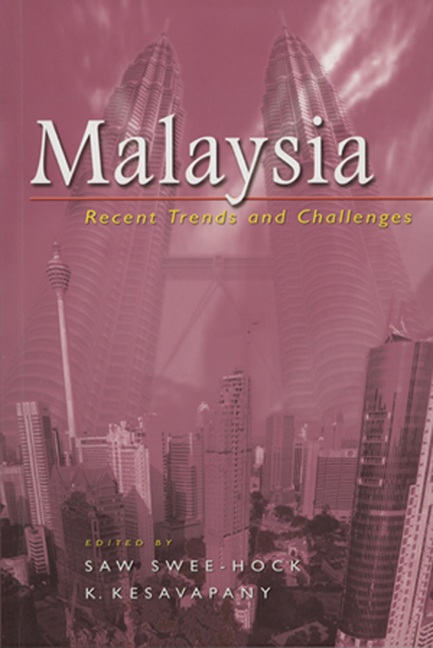Book contents
- Frontmatter
- Content
- Preface
- Foreword
- Contributors
- 1 Population Trends and Patterns in Multiracial Malaysia
- 2 The Emerging Politics of Islam Hadhari
- 3 Bangsa Malaysia: Vision or Spin?
- 4 The 2004 Malaysian General Elections: Economic Development, Electoral Trends, and the Decline of the Opposition
- 5 The UMNO-PAS Struggle: Analysis of PAS's Defeat in 2004
- 6 The Malay Electorate in 2004: Reversing the 1999 Result?
- 7 UMNO and BN in the 2004 Election: The Political Culture of Complex Identities
- 8 Malaysia's Civil Service Reform: Mahathir's Legacies and Abdullah's Challenges
- 9 Reinventing Governance in Corporate Malaysia: The Challenges Ahead
- 10 Globalisation and Ethnic Integration in Malaysian Education
- 11 Globalisation and the Challenges Facing Malaysia's Economy
- 12 Promising Start to Malaysia-Singapore Relations
- Bibliography
- Index
2 - The Emerging Politics of Islam Hadhari
Published online by Cambridge University Press: 21 October 2015
- Frontmatter
- Content
- Preface
- Foreword
- Contributors
- 1 Population Trends and Patterns in Multiracial Malaysia
- 2 The Emerging Politics of Islam Hadhari
- 3 Bangsa Malaysia: Vision or Spin?
- 4 The 2004 Malaysian General Elections: Economic Development, Electoral Trends, and the Decline of the Opposition
- 5 The UMNO-PAS Struggle: Analysis of PAS's Defeat in 2004
- 6 The Malay Electorate in 2004: Reversing the 1999 Result?
- 7 UMNO and BN in the 2004 Election: The Political Culture of Complex Identities
- 8 Malaysia's Civil Service Reform: Mahathir's Legacies and Abdullah's Challenges
- 9 Reinventing Governance in Corporate Malaysia: The Challenges Ahead
- 10 Globalisation and Ethnic Integration in Malaysian Education
- 11 Globalisation and the Challenges Facing Malaysia's Economy
- 12 Promising Start to Malaysia-Singapore Relations
- Bibliography
- Index
Summary
Introduction
Islam Hadhari was a key campaign issue during the 2004 general elections in Malaysia. Its message of a “progressive” Islam was popular with the electorate, resulting in a ringing endorsement of Prime Minister Abdullah Badawi at the polls on 21 March. The idea of a “progressive” Islam, however, is not new and has been a recurring feature of the Malaysian political landscape since the early 1970s. “Progressive” Islam is part of a long history of contested interpretations of Islam between the United Malays’ National Organisation (UMNO), Pan-Malaysia Islamic Party (PAS) and Malaysian Muslim Youth Organisation (ABIM) for their respective interests. The ways in which “progressive” Islam is interpreted and contested can be analytically captured as the struggle for legitimacy within the modern nation-state.
The modern nation-state is a relatively recent project in Southeast Asia that frames the multiple religious, ethnic and linguistic fissures in the region. The way in which “progressive” interpretations of Islam are emphasised and de-emphasised by different groups at different times reflects the on-going dispute over the character of the nation-state and its accoutring principles of democracy, notions of citizenship, and constitution. The nation-state, in turn, has also issued challenges to Islamic interests and powers in the region. According to Hefner and Horvatich,
Its capacity to shape public affairs and intervene in the most intimate domains of private life has presented Southeast Asian Muslims with a historically unprecedented challenge. It has reduced the territorial fragmentation long characteristic of this region, undercut the autonomy of Muslim social organisations, and, at times, deployed forces to hunt down and eliminate Muslim rebels.
Increased religiosity and demands for an Islamic state are thus, on the one hand, a result of the rejection of the modern nation-state and on the other, invariably shaped by its existing institutes and practices.
- Type
- Chapter
- Information
- MalaysiaRecent Trends and Challenges, pp. 26 - 46Publisher: ISEAS–Yusof Ishak InstitutePrint publication year: 2005

